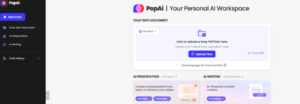In today’s digital age, Artificial Intelligence (AI) is revolutionizing various aspects of our lives, and the process of applying to schools is no exception. As technology continues to advance, AI tools and capabilities are becoming increasingly valuable in supporting students throughout the school application journey.

The Role of AI in School Applications
Personalized Assistance: AI-powered tools, such as PopAi, can provide personalized guidance and recommendations to students based on their academic profile, interests, and career goals. These tools can help students identify the best-fit schools, craft compelling personal statements, and navigate the complex application process.
AI-Generated Content: AI language models, like ChatGPT, can assist students in creating high-quality written content for their applications, such as essays, letters of recommendation, and scholarship applications. These AI tools can help students overcome writer’s block, generate ideas, and refine their writing to showcase their unique perspectives.
Multimedia Assistance: AI-powered tools can also help students create visually appealing and impactful application materials. AI-generated PowerPoint presentations, infographics, and even AI-created images can help students stand out in the competitive admissions landscape.
Application Tracking and Organization: AI-powered tools can help students stay organized and on top of their application deadlines, requirements, and submission processes. These tools can track application statuses, provide reminders, and even suggest strategies for managing the overall application journey.
Mitigating Potential Drawbacks
While AI can be a powerful ally in the school application process, it’s important to ensure that its use does not lead to unintended consequences. Here are some ways to avoid potential pitfalls:
Authenticity and Originality: Schools are looking for genuine and authentic applicants. While AI can assist in the application process, it’s crucial that students maintain their personal voice and ensure that the content they submit is a true reflection of their own experiences, abilities, and aspirations.
Ethical Considerations: Students should be mindful of the ethical implications of using AI tools, such as the potential for plagiarism or misrepresentation. It’s important to follow the guidelines and policies of each institution to ensure that the use of AI aligns with the school’s expectations.
Balanced Approach: While AI can be a valuable tool, it should not replace the students’ own effort and engagement in the application process. Students should use AI as a complement to their own research, critical thinking, and personal development, rather than relying on it as a sole solution.
The Future of AI in School Applications
As AI technology continues to evolve, its applications in the school application process are likely to become even more extensive and transformative. Beyond assisting with school applications, AI may play a role in other aspects of the educational journey, such as personalized learning, academic performance monitoring, and career guidance.
In the realm of AI-generated content, the future holds exciting possibilities. AI-created images, for instance, can help students visualize and express their ideas in innovative ways, potentially transforming the way they approach application materials and portfolios.
Conclusion
AI has the potential to revolutionize the school application process, providing students with personalized guidance, content generation assistance, and organizational support. By leveraging AI tools responsibly and maintaining a balanced approach, students can enhance their chances of standing out in the competitive admissions landscape. As AI continues to evolve, its impact on education will likely become increasingly profound, offering new avenues for students to showcase their talents and achieve their academic and professional aspirations.
